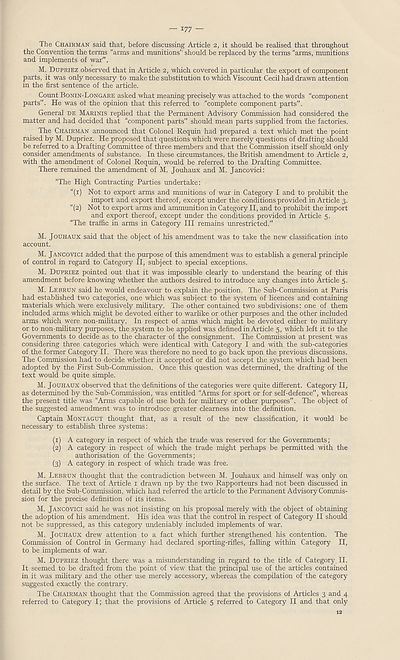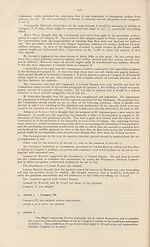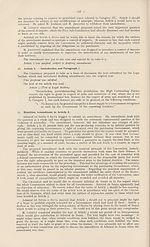Armament > Conference for the control of the international trade in arms, munitions and implements of war
(179)
Download files
Complete book:
Individual page:
Thumbnail gallery: Grid view | List view

177 —
The Chairman said that, before discussing Article 2, it should be realised that throughout
the Convention the terms “arms and munitions’' should be replaced by the terms “arms, munitions
and implements of war”.
M. Dupriez observed that in Article 2, which covered in particular the export of component
parts, it was only necessary to make the substitution to which Viscount Cecil had drawn attention
in the first sentence of the article.
Count Bonin-Longare asked what meaning precisely was attached to the words “component
parts”. He was of the opinion that this referred to “complete component parts”.
General de Marinis replied that the Permanent Advisory Commission had considered the
matter and had decided that “component parts” should mean parts supplied from the factories.
The Chairman announced that Colonel Requin had prepared a text which met the point
raised by M. Dupriez. He proposed that questions which were merely questions of drafting should
be referred to a Drafting Committee of three members and that the Commission itself should only
consider amendments of substance. In these circumstances, the British amendment to Article 2,
with the amendment of Colonel Requin, would be referred to the Drafting Committee.
There remained the amendment of M. Jouhaux and M. Jancovici:
“The High Contracting Parties undertake:
“(1) Not to export arms and munitions of war in Category I and to prohibit the
import and export thereof, except under the conditions provided in Article 3.
“(2) Not to export arms and ammunition in Category II, and to prohibit the import
and export thereof, except under the conditions provided in Article 5.
“The traffic in arms in Category III remains unrestricted.”
M. Jouhaux said that the object of his amendment was to take the new classification into
account.
M. Jancovici added that the purpose of this amendment was to establish a general principle
of control in regard to Category II, subject to special exceptions.
M. Dupriez pointed out that it was impossible clearly to understand the bearing of this
amendment before knowing whether the authors desired to introduce any changes into Article 5.
M. Lebrun said he would endeavour to explain the position. The Sub-Commission at Paris
had established two categories, one which was subject to the system of licences and containing
materials which were exclusively military. The other contained two subdivisions: one of them
included arms which might be devoted either to warlike or other purposes and the other included
arms which were non-military. In respect of arms which might be devoted either to military
or to non-military purposes, the system to be applied was defined in Article 5, which left it to the
Governments to decide as to the character of the consignment. The Commission at present was
considering three categories which were identical with Category I and with the sub-categories
of the former Category II. There was therefore no need to go back upon the previous discussions.
The Commission had to decide whether it accepted or did not accept the system which had been
adopted by the First Sub-Commission. Once this question was determined, the drafting of the
text would be quite simple.
M. Jouhaux observed that the definitions of the categories were quite different. Category II,
as determined by the Sub-Commission, was entitled “Arms for sport or for self-defence”, whereas
the present title was “Arms capable of use both for military or other purposes”. The object of
the suggested amendment was to introduce greater clearness into the definition.
Captain Montague thought that, as a result of the new classification, it would be
necessary to establish three systems:
(1) A category in respect of which the trade was reserved for the Governments;
(2) A category in respect of which the trade might perhaps be permitted with the
authorisation of the Governments;
(3) A category in respect of which trade was free.
M. Lebrun thought that the contradiction between M. Jouhaux and himself was only on
the surface. The text of Article 1 drawn up by the two Rapporteurs had not been discussed in
detail by the Sub-Commission, which had referred the article to the Permanent Advisory Commis¬
sion for the precise definition of its items.
M. Jancovici said he was not insisting on his proposal merely with the object of obtaining
the adoption of his amendment. His idea was that the control in respect of Category II should
not be suppressed, as this category undeniably included implements of war.
M. Jouhaux drew attention to a fact which further strengthened his contention. The
Commission of Control in Germany had declared sporting-rifles, falling within Category II,
to be implements of war.
M. Dupriez thought there was a misunderstanding in regard to the title of Category II.
It seemed to be drafted from the point of view that the principal use of the articles contained
in it was military and the other use merely accessory, whereas the compilation of the category
suggested exactly the contrary.
The Chairman thought that the Commission agreed that the provisions of Articles 3 and 4
referred to Category I; that the provisions of Article 5 referred to Category II and that only
12
The Chairman said that, before discussing Article 2, it should be realised that throughout
the Convention the terms “arms and munitions’' should be replaced by the terms “arms, munitions
and implements of war”.
M. Dupriez observed that in Article 2, which covered in particular the export of component
parts, it was only necessary to make the substitution to which Viscount Cecil had drawn attention
in the first sentence of the article.
Count Bonin-Longare asked what meaning precisely was attached to the words “component
parts”. He was of the opinion that this referred to “complete component parts”.
General de Marinis replied that the Permanent Advisory Commission had considered the
matter and had decided that “component parts” should mean parts supplied from the factories.
The Chairman announced that Colonel Requin had prepared a text which met the point
raised by M. Dupriez. He proposed that questions which were merely questions of drafting should
be referred to a Drafting Committee of three members and that the Commission itself should only
consider amendments of substance. In these circumstances, the British amendment to Article 2,
with the amendment of Colonel Requin, would be referred to the Drafting Committee.
There remained the amendment of M. Jouhaux and M. Jancovici:
“The High Contracting Parties undertake:
“(1) Not to export arms and munitions of war in Category I and to prohibit the
import and export thereof, except under the conditions provided in Article 3.
“(2) Not to export arms and ammunition in Category II, and to prohibit the import
and export thereof, except under the conditions provided in Article 5.
“The traffic in arms in Category III remains unrestricted.”
M. Jouhaux said that the object of his amendment was to take the new classification into
account.
M. Jancovici added that the purpose of this amendment was to establish a general principle
of control in regard to Category II, subject to special exceptions.
M. Dupriez pointed out that it was impossible clearly to understand the bearing of this
amendment before knowing whether the authors desired to introduce any changes into Article 5.
M. Lebrun said he would endeavour to explain the position. The Sub-Commission at Paris
had established two categories, one which was subject to the system of licences and containing
materials which were exclusively military. The other contained two subdivisions: one of them
included arms which might be devoted either to warlike or other purposes and the other included
arms which were non-military. In respect of arms which might be devoted either to military
or to non-military purposes, the system to be applied was defined in Article 5, which left it to the
Governments to decide as to the character of the consignment. The Commission at present was
considering three categories which were identical with Category I and with the sub-categories
of the former Category II. There was therefore no need to go back upon the previous discussions.
The Commission had to decide whether it accepted or did not accept the system which had been
adopted by the First Sub-Commission. Once this question was determined, the drafting of the
text would be quite simple.
M. Jouhaux observed that the definitions of the categories were quite different. Category II,
as determined by the Sub-Commission, was entitled “Arms for sport or for self-defence”, whereas
the present title was “Arms capable of use both for military or other purposes”. The object of
the suggested amendment was to introduce greater clearness into the definition.
Captain Montague thought that, as a result of the new classification, it would be
necessary to establish three systems:
(1) A category in respect of which the trade was reserved for the Governments;
(2) A category in respect of which the trade might perhaps be permitted with the
authorisation of the Governments;
(3) A category in respect of which trade was free.
M. Lebrun thought that the contradiction between M. Jouhaux and himself was only on
the surface. The text of Article 1 drawn up by the two Rapporteurs had not been discussed in
detail by the Sub-Commission, which had referred the article to the Permanent Advisory Commis¬
sion for the precise definition of its items.
M. Jancovici said he was not insisting on his proposal merely with the object of obtaining
the adoption of his amendment. His idea was that the control in respect of Category II should
not be suppressed, as this category undeniably included implements of war.
M. Jouhaux drew attention to a fact which further strengthened his contention. The
Commission of Control in Germany had declared sporting-rifles, falling within Category II,
to be implements of war.
M. Dupriez thought there was a misunderstanding in regard to the title of Category II.
It seemed to be drafted from the point of view that the principal use of the articles contained
in it was military and the other use merely accessory, whereas the compilation of the category
suggested exactly the contrary.
The Chairman thought that the Commission agreed that the provisions of Articles 3 and 4
referred to Category I; that the provisions of Article 5 referred to Category II and that only
12
Set display mode to:
![]() Universal Viewer |
Universal Viewer | ![]() Mirador |
Large image | Transcription
Mirador |
Large image | Transcription
Images and transcriptions on this page, including medium image downloads, may be used under the Creative Commons Attribution 4.0 International Licence unless otherwise stated. ![]()
| League of Nations > Armament > Conference for the control of the international trade in arms, munitions and implements of war > (179) |
|---|
| Permanent URL | https://digital.nls.uk/195384090 |
|---|
| Shelfmark | LN.IX |
|---|
| Description | Over 1,200 documents from the non-political organs of the League of Nations that dealt with health, disarmament, economic and financial matters for the duration of the League (1919-1945). Also online are statistical bulletins, essential facts, and an overview of the League by the first Secretary General, Sir Eric Drummond. These items are part of the Official Publications collection at the National Library of Scotland. |
|---|---|
| Additional NLS resources: |
|

